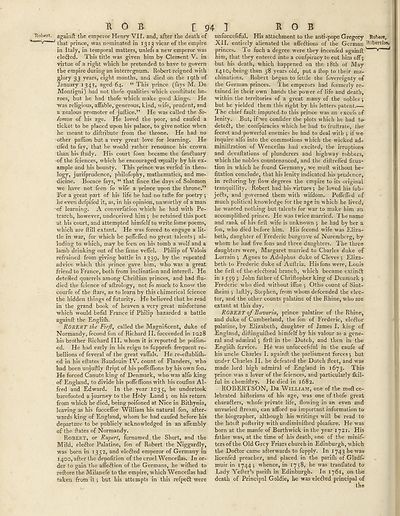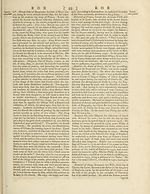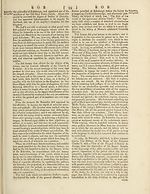Encyclopaedia Britannica, or, a Dictionary of arts, sciences, and miscellaneous literature : enlarged and improved. Illustrated with nearly six hundred engravings > Volume 18, RHI-SCR
(102) Page 94
Download files
Complete book:
Individual page:
Thumbnail gallery: Grid view | List view

ROB [ 94 1 ROB
Ttolx'rt. agalnrt: the emperor Henry VII. and, after the death of
that prince, was nominated in 1313 vicar of the empire
in Italy, in temporal matters, unlefs a new emperor was
ele&ed. This title was given him by Clement V. in
virtue of a right which he pretended to have to govern
the empire during an interregnum. Robert reigned with
glory 33 years, eight months, and died on the 19th of
January 1343, aged 64. “ This prince (fays M. De
Montigni) had not thofe qualities which conditute he¬
roes, but he had thofe which make good kings. He
•was religious, affable, generous, kind, wife, prudent, and
a zealous promoter of juftice.” He was called the So-
lomon of his age. He loved the poor, and caufed a
ticket to be placed upon his palace, to give notice when
he meant to diftribute from the throne. He had no
other paflion but a very great love for learning. He
ufed to fay, that he would rather renounce his crown
than his ftudy. His court foon became the fanftuary
of the fciences, which he encouraged equally by his ex¬
ample and his bounty. This prince was verfed in theo-
logy, jurifprudence, philofophy, mathematics, and me¬
dicine. Bocace fays, “ that fince the days of Solomon
we have not feen fo wife a prince upon the throne.”
For a great part of his life he had no tafte for poetry;
he even defpifed it, as, in his opinion, unworthy of a man
of learning. A converfation which he had with Pe¬
trarch, however, undeceived him ; he retained this poet
at his court, and attempted himfelf to write fome poems,
which are ftill extant. He was forced to engage a lit¬
tle in war, for which he poffeffed no great talents ] al¬
luding to which, may be feen on his tomb a wolf and a
lamb drinking out of the fame veffel. Philip of Valois
refrained from giving battle in 1339, by the repeated
advice which this prince gave him, who was a great
friend to France, both from inclination and intereft. He
detefted quarrels among Chriftian princes, and had flu-
died the fcience of aftrology, not fo much to know the
courfe of the flars, as to learn by this chimerical fcience
the hidden things of futurity. He believed that he read
in the grand book of heaven a very great misfortune
which would befal France if Philip hazarded a battle
againft the Englifh,
RORERT the FirJI) called the Magnificent, duke of
Normandy, fecond fon of Richard II. fucceeded in 1028
his brother Richard III. whom it is reported he poifon-
ed. He had early in his reign to fupprefs frequent re¬
bellions of feveral of the great vaffals. He re-eftablifh-
ed in his eflates Baudouin IV. count of Flanders, who
had been unjuftly flript of his poffeffions by his own fon.
He forced Canute king of Denmark, who was alfo king
of England, to divide his poffeflions with his coufins Al¬
fred and Edward. In the year 1035, he undertook
barefooted a journey to the Holy Land *, on his return
from which he died, being poifoned at Nice in Bithynia,
leaving as his fucceffor William his natural fon, after¬
wards king of England, whom he had caufed before his
departure to be publicly acknowledged in an affembly
of the ftates of Normandy.
Robert, or Rupert, furnamed the Short, and the
Mild, elector Palatine, fon of Robert the Niggardly,
was born in 1352, and elefted emperor of Germany in
1400, after the depofition of the cruel Wenceflas. In or¬
der to gain the affeftion of the Germans, he wilhed to
reftore the Milanefe to the empire, which Wenceflas had
taken from it; but his attempts in this refpe& were
unfuccefsful. His attachment to the anti-pope Gregory Robert,
XII. entirely alienated the affections of the German Robertfon,
princes. To fuch a degree were they incenfed againft * *
him, that they entered into a confpiracy to cut him off;
but his death, which happened on the i8tb of May
1410, being then 58 years old, put a flop to their ma¬
chinations. Robert began to fettle the fovereignty of
the German princes. The emperors bad formerly re¬
tained in their own hands the power of life and death,
within the territories of a great many of the nobles ;
but he yielded them this right by his letters patent.—
The chief fault imputed-to this prince was an excels of
lenity. But, if we confider the plots which he had to-
deteft, the confpiracies which he had to irulirate, the
fecret and pow'erful enemies he had to deal with ; if we
inquire alfo into the commotions which the wicked ad-
miniftration of Wenceflas had excited, the irruptions
and devaftations of plunderers and highway robbers,
which the nobles countenanced, and the diftreffed fitua-
tion in which he found Germany, we muft without he-
fitation conclude, that his lenity indicated his prudence,
in reftoring by flow degrees the empire to its original
tranquillity. Robert had his virtues ; he loved his fub-
jefts, and governed them with wifdom. Poffeffed of
much political knowledge for the age in which he lived,
he wanted nothing but talents for war to make him an
accomplifhed prince. He was twice married. The name
and rank of his firft wife is unknown ; he had by her a
fon, who died before him. His fecond wife was Eliza¬
beth, daughter of Frederic burgrave of Nuremberg, by
whom he had five fons and three daughters. The three
daughters W'ere, Margaret married to Charles duke of
Lorrain ; Agnes to Adolphus duke of Cleves ; Eliza¬
beth to Frederic duke of Auftria. His fons w7ere, Louis
the firft of the electoral branch, w7hich became extinCt
in 1559 j John father of Chriftopher king of Denmark ;
Frederic who died without iffue ; Otho count of Sint-
fheim ; laftly, Stephen, from whom defeended the elec¬
tor, and the other counts palatine of the Rhine, who are
extant at this day.
ROBERT of Bavaria, prince palatine of the Rhine,
and duke of Cumberland, the fon of Frederic, eleCtor
palatine, by Elizabeth, daughter of James I. king of
England, diflinguiflied himfelf by his valour as a gene¬
ral and admiral ; firft in the Dutch, and then in the
Englifh fervice. He was unfuccefsful in the caufe of
his uncle Charles I. againft the parliament forces; but
under Charles II. he defeated the Dutch fleet, and was
made lord high admiral of England in 1673. This
prince was a lover of the fciences, and particularly fkil-
ful in chemiftry. He died in 1682.
ROBERTSON, Dr William, one of the moft ce¬
lebrated hiftorians of his age, wras one of thofe great
charafters, whofe private life, flowing in an even and
unvaried ftream, can afford no important information to
the biographer, although his writings will be read to
the lateft pofterity with undiminifhed pleafure. He was
born at the manfe of Borthwick in the year 1721. His
father was, at the time of his death, one of the minif-
ters of the Old Grey Friars church in Edinburgh, which
the DoCIor came afterwards to fupply. In 1743 he was
licenfed preacher, and placed in the parifh of Gladf-
muir in 1744; whence, in 1758, he was tranflated to
Lady Yefter’s parifh in Edinburgh. In 1761, on the
death of Principal Goldie, he was eleCled principal of
Ttolx'rt. agalnrt: the emperor Henry VII. and, after the death of
that prince, was nominated in 1313 vicar of the empire
in Italy, in temporal matters, unlefs a new emperor was
ele&ed. This title was given him by Clement V. in
virtue of a right which he pretended to have to govern
the empire during an interregnum. Robert reigned with
glory 33 years, eight months, and died on the 19th of
January 1343, aged 64. “ This prince (fays M. De
Montigni) had not thofe qualities which conditute he¬
roes, but he had thofe which make good kings. He
•was religious, affable, generous, kind, wife, prudent, and
a zealous promoter of juftice.” He was called the So-
lomon of his age. He loved the poor, and caufed a
ticket to be placed upon his palace, to give notice when
he meant to diftribute from the throne. He had no
other paflion but a very great love for learning. He
ufed to fay, that he would rather renounce his crown
than his ftudy. His court foon became the fanftuary
of the fciences, which he encouraged equally by his ex¬
ample and his bounty. This prince was verfed in theo-
logy, jurifprudence, philofophy, mathematics, and me¬
dicine. Bocace fays, “ that fince the days of Solomon
we have not feen fo wife a prince upon the throne.”
For a great part of his life he had no tafte for poetry;
he even defpifed it, as, in his opinion, unworthy of a man
of learning. A converfation which he had with Pe¬
trarch, however, undeceived him ; he retained this poet
at his court, and attempted himfelf to write fome poems,
which are ftill extant. He was forced to engage a lit¬
tle in war, for which he poffeffed no great talents ] al¬
luding to which, may be feen on his tomb a wolf and a
lamb drinking out of the fame veffel. Philip of Valois
refrained from giving battle in 1339, by the repeated
advice which this prince gave him, who was a great
friend to France, both from inclination and intereft. He
detefted quarrels among Chriftian princes, and had flu-
died the fcience of aftrology, not fo much to know the
courfe of the flars, as to learn by this chimerical fcience
the hidden things of futurity. He believed that he read
in the grand book of heaven a very great misfortune
which would befal France if Philip hazarded a battle
againft the Englifh,
RORERT the FirJI) called the Magnificent, duke of
Normandy, fecond fon of Richard II. fucceeded in 1028
his brother Richard III. whom it is reported he poifon-
ed. He had early in his reign to fupprefs frequent re¬
bellions of feveral of the great vaffals. He re-eftablifh-
ed in his eflates Baudouin IV. count of Flanders, who
had been unjuftly flript of his poffeffions by his own fon.
He forced Canute king of Denmark, who was alfo king
of England, to divide his poffeflions with his coufins Al¬
fred and Edward. In the year 1035, he undertook
barefooted a journey to the Holy Land *, on his return
from which he died, being poifoned at Nice in Bithynia,
leaving as his fucceffor William his natural fon, after¬
wards king of England, whom he had caufed before his
departure to be publicly acknowledged in an affembly
of the ftates of Normandy.
Robert, or Rupert, furnamed the Short, and the
Mild, elector Palatine, fon of Robert the Niggardly,
was born in 1352, and elefted emperor of Germany in
1400, after the depofition of the cruel Wenceflas. In or¬
der to gain the affeftion of the Germans, he wilhed to
reftore the Milanefe to the empire, which Wenceflas had
taken from it; but his attempts in this refpe& were
unfuccefsful. His attachment to the anti-pope Gregory Robert,
XII. entirely alienated the affections of the German Robertfon,
princes. To fuch a degree were they incenfed againft * *
him, that they entered into a confpiracy to cut him off;
but his death, which happened on the i8tb of May
1410, being then 58 years old, put a flop to their ma¬
chinations. Robert began to fettle the fovereignty of
the German princes. The emperors bad formerly re¬
tained in their own hands the power of life and death,
within the territories of a great many of the nobles ;
but he yielded them this right by his letters patent.—
The chief fault imputed-to this prince was an excels of
lenity. But, if we confider the plots which he had to-
deteft, the confpiracies which he had to irulirate, the
fecret and pow'erful enemies he had to deal with ; if we
inquire alfo into the commotions which the wicked ad-
miniftration of Wenceflas had excited, the irruptions
and devaftations of plunderers and highway robbers,
which the nobles countenanced, and the diftreffed fitua-
tion in which he found Germany, we muft without he-
fitation conclude, that his lenity indicated his prudence,
in reftoring by flow degrees the empire to its original
tranquillity. Robert had his virtues ; he loved his fub-
jefts, and governed them with wifdom. Poffeffed of
much political knowledge for the age in which he lived,
he wanted nothing but talents for war to make him an
accomplifhed prince. He was twice married. The name
and rank of his firft wife is unknown ; he had by her a
fon, who died before him. His fecond wife was Eliza¬
beth, daughter of Frederic burgrave of Nuremberg, by
whom he had five fons and three daughters. The three
daughters W'ere, Margaret married to Charles duke of
Lorrain ; Agnes to Adolphus duke of Cleves ; Eliza¬
beth to Frederic duke of Auftria. His fons w7ere, Louis
the firft of the electoral branch, w7hich became extinCt
in 1559 j John father of Chriftopher king of Denmark ;
Frederic who died without iffue ; Otho count of Sint-
fheim ; laftly, Stephen, from whom defeended the elec¬
tor, and the other counts palatine of the Rhine, who are
extant at this day.
ROBERT of Bavaria, prince palatine of the Rhine,
and duke of Cumberland, the fon of Frederic, eleCtor
palatine, by Elizabeth, daughter of James I. king of
England, diflinguiflied himfelf by his valour as a gene¬
ral and admiral ; firft in the Dutch, and then in the
Englifh fervice. He was unfuccefsful in the caufe of
his uncle Charles I. againft the parliament forces; but
under Charles II. he defeated the Dutch fleet, and was
made lord high admiral of England in 1673. This
prince was a lover of the fciences, and particularly fkil-
ful in chemiftry. He died in 1682.
ROBERTSON, Dr William, one of the moft ce¬
lebrated hiftorians of his age, wras one of thofe great
charafters, whofe private life, flowing in an even and
unvaried ftream, can afford no important information to
the biographer, although his writings will be read to
the lateft pofterity with undiminifhed pleafure. He was
born at the manfe of Borthwick in the year 1721. His
father was, at the time of his death, one of the minif-
ters of the Old Grey Friars church in Edinburgh, which
the DoCIor came afterwards to fupply. In 1743 he was
licenfed preacher, and placed in the parifh of Gladf-
muir in 1744; whence, in 1758, he was tranflated to
Lady Yefter’s parifh in Edinburgh. In 1761, on the
death of Principal Goldie, he was eleCled principal of
Set display mode to:
![]() Universal Viewer |
Universal Viewer | ![]() Mirador |
Large image | Transcription
Mirador |
Large image | Transcription
Images and transcriptions on this page, including medium image downloads, may be used under the Creative Commons Attribution 4.0 International Licence unless otherwise stated. ![]()
| Permanent URL | https://digital.nls.uk/193020033 |
|---|
| Attribution and copyright: |
|
|---|
| Description | Ten editions of 'Encyclopaedia Britannica', issued from 1768-1903, in 231 volumes. Originally issued in 100 weekly parts (3 volumes) between 1768 and 1771 by publishers: Colin Macfarquhar and Andrew Bell (Edinburgh); editor: William Smellie: engraver: Andrew Bell. Expanded editions in the 19th century featured more volumes and contributions from leading experts in their fields. Managed and published in Edinburgh up to the 9th edition (25 volumes, from 1875-1889); the 10th edition (1902-1903) re-issued the 9th edition, with 11 supplementary volumes. |
|---|---|
| Additional NLS resources: |
|

